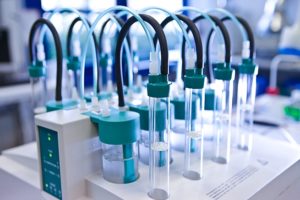Analytics
… of the Characteristics of Fuels

Rancimat test for the determination of the oxidation stability of fuels. Photo: OWI
In the chemistry laboratory of OWI wide-ranging, standardised and non-standardised analyses and methods of fuels can be applied. The basis is established measuring and testing methods, but research projects usually require methods that go beyond the state of the art. The development of new methods is often necessary. At OWI, the physical-chemical characteristics of liquid fuels are determined on either in idealised systems and individual component analyses or by means of fuels analytics.
Currently the following physical-chemical characteristics of liquid fuels can be examined:
- Measurement of ignition delay and cetane number of middle distillates and blends with the Advanced Fuel Ignition Delay Analyzer (AFIDA)
- Detection of the concentration of elements in fuels and aqueous solutions using Inductively Coupled Plasma – Optical Emission Spectrometry (ICP-OES)
- Analysis of lubricants with Fourier Transform Infrared Spectroscopy (FTIR)
- Determination of the ageing stability of fuels and combustibles in accordance with DIN ISO 12205 using the Thermal Oxidation Stability Test (TOST)Storage stability: storage of fuels at temperature from 8 °C to 40 °C (possible up to 100 °C) in specific climate cabinets and analysis according to norm (DIN 51371)
- Oxidation stability: change of the stability characteristics by admixture of regenerative fuels (modified Rancimat EN 15751, PetroOxy EN 16091) as well as development of new analysis methods (self-developed method DGMK 714 or oxidation stability according to chemiluminescence).
- Thermal stability: changes under high thermal stress (preheater, nozzle) according to DIN 51471
- Material compatibility: interdependencies of fuels and polymers and elastomers (seal, etc.) and corrosion characteristics (steel-pin-corrosion-tests DIN ISO 7120) and non-ferrous metal corrosion
- Deposit formation: determination of deposit formation during the idealised drop evaporation, in combustion systems and in pumps
- Effect of additives: tribological testing apparatus, pump torque test rig, oil burner pumps, combustion characteristics, aging and stability
- Cloudiness of fuels by transmission measurements
- Peroxide and acid number as well as water content as important characteristics regarding stability
- Thermogravimetric analysis: Investigations of thermal and thermos-oxidative processes under various test conditions as temperature profile (dynamic or isothermal) and reactive gas
- Simulated Distillation: Gaschromatographic investigation for the determination of the boiling range (oder distillation range) of different liquid hydrocarbons
- High-Performance-Liquid-Chromatography: Characterization of liquid hydrocarbons regarding the aromatic / aliphatic content or molecular size
In the field of fuel analytics, OWI Science for Fuels cooperates with accredited laboratories. For tasks of special analytics (such as REM-EDX, IR, HPLC), one draws on the infrastructure of institutes of the RWTH Aachen and other universities.
